Havilah
On this page, you find all documents, package deals, and flashcards offered by seller Havilah.
- 2336
- 0
- 36
Community
- Followers
- Following
42 Reviews received
2379 items
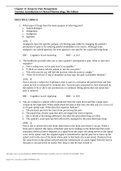
Chapter 11: Drugs for Pain Management Visovsky: Introduction to Clinical Pharmacology, 9th Edition A Graded
1. What types of drugs have the main purpose of relieving pain? a. Anticholinergics b. Antagonists c. Analgesics d. Agonists ANS: C Analgesics have the specific purpose of relieving pain either by changing the patient’s perception of pain or by reducing painful stimulation at its source. Although some analgesics are opioid agonists, the term agonist is not specific for a pain-relieving drug. DIF: Cognitive Level: Knowing REF: p. 213 2. The healthcare provider asks you to rate a patie...
- Exam (elaborations)
- • 6 pages •
1. What types of drugs have the main purpose of relieving pain? a. Anticholinergics b. Antagonists c. Analgesics d. Agonists ANS: C Analgesics have the specific purpose of relieving pain either by changing the patient’s perception of pain or by reducing painful stimulation at its source. Although some analgesics are opioid agonists, the term agonist is not specific for a pain-relieving drug. DIF: Cognitive Level: Knowing REF: p. 213 2. The healthcare provider asks you to rate a patie...
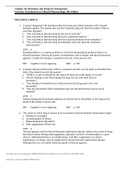
Chapter 16: Hormones and Drugs for Osteoporosis Visovsky: Introduction to Clinical Pharmacology, 9th Edition
A patient diagnosed with hypothyroidism has been prescribed treatment with a thyroid hormone agonist. The patient asks you how long this drug will need to be taken. What is your best response? a. “You will need to take this drug for the rest of your life.” b. “You will need to take this drug until your symptoms improve.” c. “You will need to take this drug until your thyroid hormone level normalizes.” d. “You will need to take this drug incrementally until you reach the maxim...
- Exam (elaborations)
- • 9 pages •
A patient diagnosed with hypothyroidism has been prescribed treatment with a thyroid hormone agonist. The patient asks you how long this drug will need to be taken. What is your best response? a. “You will need to take this drug for the rest of your life.” b. “You will need to take this drug until your symptoms improve.” c. “You will need to take this drug until your thyroid hormone level normalizes.” d. “You will need to take this drug incrementally until you reach the maxim...
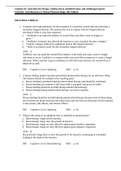
Chapter 05: Anti-infective Drugs: Antibacterial, Antitubercular, and Antifungal Agents Visovsky: Introduction to Clinical Pharmacology, 9th Edition
A patient receiving antibiotics for the treatment of a bacterial wound infection develops a secondary fungal infection. The patient asks you to explain why the fungal infection developed. What is your best response? a. “Antibiotics can upset the balance of normal flora and allow yeast or fungus to grow.” b. “Antibiotic resistance has allowed the bacteria in your wound to become a fungus.” c. “Genetic changes induced by antibiotics lead to this fungal infection.” d. “There is...
- Exam (elaborations)
- • 12 pages •
A patient receiving antibiotics for the treatment of a bacterial wound infection develops a secondary fungal infection. The patient asks you to explain why the fungal infection developed. What is your best response? a. “Antibiotics can upset the balance of normal flora and allow yeast or fungus to grow.” b. “Antibiotic resistance has allowed the bacteria in your wound to become a fungus.” c. “Genetic changes induced by antibiotics lead to this fungal infection.” d. “There is...
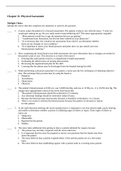
Chapter 21. Physical Assessment A Graded
A nurse wakes the patient for a focused assessment. The patient, trying to rest, tells the nurse, “I wish you would quit waking me up. Do you really need to keep bothering me?” The nurse appropriately responds: 1. “Most patients would love to get the attention that you are getting.” 2. “I understand your frustration, but this has been ordered by your physician.” 3. “It is necessary that I do a head-to-toe assessment from which I can determine whether there are any changes in y...
- Exam (elaborations)
- • 30 pages •
A nurse wakes the patient for a focused assessment. The patient, trying to rest, tells the nurse, “I wish you would quit waking me up. Do you really need to keep bothering me?” The nurse appropriately responds: 1. “Most patients would love to get the attention that you are getting.” 2. “I understand your frustration, but this has been ordered by your physician.” 3. “It is necessary that I do a head-to-toe assessment from which I can determine whether there are any changes in y...
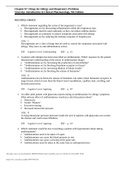
Chapter 07: Drugs for Allergy and Respiratory Problems Visovsky: Introduction to Clinical Pharmacology, 9th Edition
Which statement regarding the action of decongestants is true? a. Decongestants act by decreasing inflammation within the respiratory tract. b. Decongestants must be used cautiously as they can induce asthma attacks. c. Decongestants act primarily to reduce symptoms associated with allergy. d. Decongestants act by reducing the immune response of lymphocytes. ANS: C Decongestants are a class of drugs that are used to control the symptoms associated with allergy. They have no anti-inflammat...
- Exam (elaborations)
- • 6 pages •
Which statement regarding the action of decongestants is true? a. Decongestants act by decreasing inflammation within the respiratory tract. b. Decongestants must be used cautiously as they can induce asthma attacks. c. Decongestants act primarily to reduce symptoms associated with allergy. d. Decongestants act by reducing the immune response of lymphocytes. ANS: C Decongestants are a class of drugs that are used to control the symptoms associated with allergy. They have no anti-inflammat...
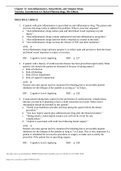
Chapter 12: Anti-inflammatory, Antiarthritis, and Antigout Drugs Visovsky: Introduction to Clinical Pharmacology, 9th Edition
A patient with joint inflammation is prescribed an anti-inflammatory drug. The patient asks you how this drug works to address this problem. What is your best response? a. “Anti-inflammatory drugs reduce pain and limit blood vessel responses to joint injury.” b. “Anti-inflammatory drugs contain antibacterial and anti-inflammatory properties.” c. “Anti-inflammatory drugs limit the body’s response to cortisol in the body.” d. “Anti-inflammatory drugs increase the release of T...
- Exam (elaborations)
- • 9 pages •
A patient with joint inflammation is prescribed an anti-inflammatory drug. The patient asks you how this drug works to address this problem. What is your best response? a. “Anti-inflammatory drugs reduce pain and limit blood vessel responses to joint injury.” b. “Anti-inflammatory drugs contain antibacterial and anti-inflammatory properties.” c. “Anti-inflammatory drugs limit the body’s response to cortisol in the body.” d. “Anti-inflammatory drugs increase the release of T...
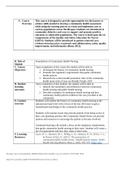
NSG C920 - C920 Course Overview A-G. Western Governors University A GRADED
A. Course Overview This course is designed to provide opportunities for the learner to achieve skills needed to develop a community health assessment while using the nursing process to create and implement care to various populations across the lifespan. Students are introduced to community didactics and ways to support and promote positive outcomes to vulnerable populations. The course is built upon the six competencies of the Quality and Safety Education for Nurses (QSEN). Students wi...
- Exam (elaborations)
- • 7 pages •
A. Course Overview This course is designed to provide opportunities for the learner to achieve skills needed to develop a community health assessment while using the nursing process to create and implement care to various populations across the lifespan. Students are introduced to community didactics and ways to support and promote positive outcomes to vulnerable populations. The course is built upon the six competencies of the Quality and Safety Education for Nurses (QSEN). Students wi...
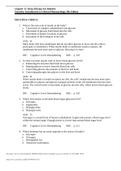
Chapter 17: Drug Therapy for Diabetes Visovsky: Introduction to Clinical Pharmacology, 9th Edition correct solutions
What is the main role of insulin in the body? a. Conversion of complex carbohydrates into glucose b. Movement of glucose from blood into the cells c. Prevention of kidney excretion of glucose d. Prevention of the formation of fat cells ANS: B Many body cells have membranes that do not allow glucose to move into the cells to participate in metabolism. When insulin binds to membrane insulin receptors, the membranes become more open to glucose, allowing it to enter. DIF: Cognitive Level: R...
- Exam (elaborations)
- • 9 pages •
What is the main role of insulin in the body? a. Conversion of complex carbohydrates into glucose b. Movement of glucose from blood into the cells c. Prevention of kidney excretion of glucose d. Prevention of the formation of fat cells ANS: B Many body cells have membranes that do not allow glucose to move into the cells to participate in metabolism. When insulin binds to membrane insulin receptors, the membranes become more open to glucose, allowing it to enter. DIF: Cognitive Level: R...
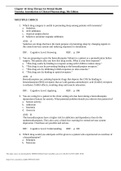
Chapter 10: Drug Therapy for Mental Health Visovsky: Introduction to Clinical Pharmacology, 9th Edition
Which drug category is useful in promoting sleep among patients with insomnia? a. Sedatives b. ACE inhibitors c. Atypical antipsychotics d. Selective serotonin reuptake inhibitors ANS: A Sedatives are drugs that have the main purpose of promoting sleep by changing signals in the central nervous system and reducing responses to stimulation. DIF: Cognitive Level: Knowing REF: p. 184 2. You are preparing to give the benzodiazepine Valium to a patient as a premedication before surgery. The...
- Exam (elaborations)
- • 8 pages •
Which drug category is useful in promoting sleep among patients with insomnia? a. Sedatives b. ACE inhibitors c. Atypical antipsychotics d. Selective serotonin reuptake inhibitors ANS: A Sedatives are drugs that have the main purpose of promoting sleep by changing signals in the central nervous system and reducing responses to stimulation. DIF: Cognitive Level: Knowing REF: p. 184 2. You are preparing to give the benzodiazepine Valium to a patient as a premedication before surgery. The...
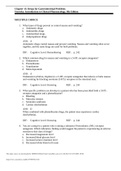
Chapter 13: Drugs for Gastrointestinal Problems Visovsky: Introduction to Clinical Pharmacology, 9th Edition VERY CORRRECT
. What types of drugs prevent or control nausea and vomiting? a. Antiemetic drugs b. Antimotility drugs c. Antidiarrheal drugs d. Antipropulsion drugs ANS: A Antiemetic drugs control nausea and prevent vomiting. Nausea and vomiting often occur together, and the same drugs are used for both problems. DIF: Cognitive Level: Remembering REF: p. 242 2. Which common drug for nausea and vomiting is a 5-HT3 receptor antagonist? a. Ondansetron b. Promethazine c. Scopolamine d. Metoclopramide...
- Exam (elaborations)
- • 7 pages •
. What types of drugs prevent or control nausea and vomiting? a. Antiemetic drugs b. Antimotility drugs c. Antidiarrheal drugs d. Antipropulsion drugs ANS: A Antiemetic drugs control nausea and prevent vomiting. Nausea and vomiting often occur together, and the same drugs are used for both problems. DIF: Cognitive Level: Remembering REF: p. 242 2. Which common drug for nausea and vomiting is a 5-HT3 receptor antagonist? a. Ondansetron b. Promethazine c. Scopolamine d. Metoclopramide...

NURSING MSN 572Advanced Physical Assessment Across the Lifespan (FNP
NURS 4465 Windshield Survey.N4465 Care of Vulnerable Populations COMMUNITY ASSESSMENT, ANALYSIS, and NURSING INTERVENTION Modules 1-3 (Weeks 1– 3) Assignment Template
Psychiatric Mental Health Nurse Practitioner Clinical Practice Portfolio.
Psychiatric Mental Health Nurse Practitioner Clinical Practice Portfolio.
Was not remotely complete
S.O.A.P. Note Template CASE ID# Tina Jones Neurological